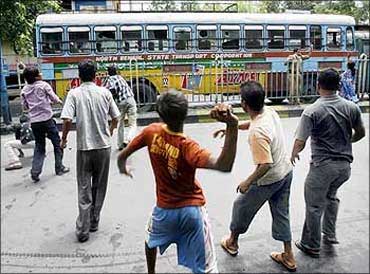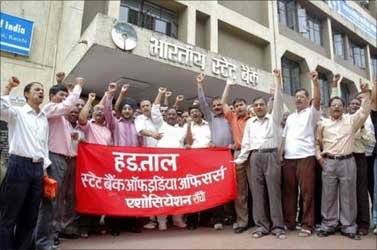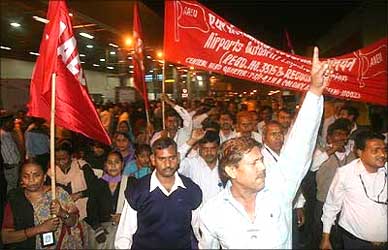 | « Back to article | Print this article |
India gets 'ready' for another bandh
Are Bharat Bandhs becoming a bi-monthly affair in India? Going by the latest trend that seems to be the case.
On July 5, 2010, the Opposition parties called a nation-wide bandh to protest the steep rise in fuel prices.
From Assocham's whooping Rs 13,000 crore (Rs 130 billion) loss, to Confederation of Indian Industry's relatively moderate Rs 3,000 crore (Rs 30 billion) loss, there is no denying that the economy suffered a huge dent.
And what was the outcome of the bandh? Fuel prices were reduced? No, they were never expected to be. Businesses suffered, common people were harassed, and once more India proved to be a democracy that can be easily be held to ransom at will.
Again on September 7, the trade unions have called a dawn to dusk bandh to protest against rise in price of daily commodities and, once again, fuel price hikes.
Politics, as they say, make strange partners. Although it's a CITU sponsored strike, the Congress-backed INTUC is also supporting it.
But media reports suggest, in Bengal neither the Congress nor the Trinamool Congress are supporting the bandh.
If you are already wondering what this bandh will achieve, we can assure you that it will achieve nothing, but will heap truck-load of misery on the common people.
To take a look at sectors that are likely to be affected the most, click on NEXT . . .
India gets 'ready' for another bandh
Banks on strike
Around 10 lakh (1 million) employees of 27 public sector banks, 18 foreign banks, 26 private banks, 82 regional rural banks and 1,721 co-operative banks will participate in Tuesday's strike.
Besides protesting against price rise, divestment in public sector banks, job losses, rampant violation of labour laws and lack of adequate protection to workers in the unorganised sector, bank employees are also demanding an increase in the number of public sector bank branches, through expansion from the present 40,000 to 100,000.
Banking operations, however, are not likely to be totally affected, as officers from the State Bank of India as also other banks, will not join the strike.
"Bank officers will not join the general strike call given by central trade unions tomorrow," All India State Bank Officers' Federation and All India Bank Officers' Confederation general secretary G D Nadaf said in a statement in Mumbai.
The officers federation would, however, extend "fraternal support" to the striking workers, he said.
According to him, only two bank unions - the All India Bank Employees Association and Bank Employees Federation of India - are participating in tomorrow's strike.
Click on NEXT to read more . . .
India gets 'ready' for another bandh
Train, air services likely to be hit
Besides the bankers, nearly 44 crore (440 million) employees, including those from organised and unorganised sectors and industries would be participating in the strike.
The strike has been called by central trade unions like INTUC, AITUC, CITU, HMS, HMKP, UTUC and various industry-wise federations covering banks, insurance, oil, coal, defence, civil aviation, Port Trusts, public sector companies, central and state Government employees, taxis and auto rickshaws, anganwadi unions and domestic workers unions, among others.
Like every other bandh, this time too passengers will face harrowing time not only reaching airports and rail stations, there is hardly any guarantee that planes and trains will be allowed to ply on time.
Click on NEXT to read more . . .
India gets 'ready' for another bandh
Emergency services to be kept out?
Even though emergency services like hospitals, and milk are kep out of the perview of the strike, every time patients face near-death situation when over enthusistic strikers refuse to let ambulances pass.
Click on NEXT to read more . . .
India gets 'ready' for another bandh
What about schools and colleges?
Since neither of them can officially support a bandh and declare a holiday, the parents are at a fix about what to do with their wards. And God help them if there is some exam scheduled.
Click on NEXT to read more . . .
India gets 'ready' for another bandh
Good break for office goers?
Quite honestly most people are bored of these bandhs.
Those who work in the private sectors regard is nothing but an unnecessary menace.
By hook or crook they have to reach office, as most organisation add a penalty clause if staffers are absent on such days.





